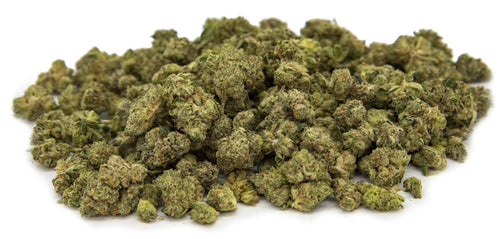#94: CBD for Pets: An Emerging Wellness Trend or Just a Fad?
#94: CBD for Pets: An Emerging Wellness Trend or Just a Fad?
For many Canadians, our pets are more than just animals, they're our furry family members. With 58% of Canadian households owning at least one pet, it's clear that we take our pets seriously. From choosing the right food to providing them with natural remedies for ailments, we want to make sure our pets are happy and healthy.
One trend that has been gaining attention in recent years is the use of CBD oils for pets. CBD, or cannabidiol, is a non-psychoactive compound found in cannabis that pet owners are turning to as a natural alternative for their pet's health and well-being.
But are CBD oils safe and effective for our four-legged friends? After all, if CBD can treat humans, why not our pets? Well, the answer is not so simple. Although CBD has shown promise in helping with certain conditions in pets, it's important to understand the potential risks and limitations before deciding to use it for your pet.
The science behind CBD

Before we dive into whether or not CBD is safe and effective for pets, let's first understand what it actually is. As mentioned, CBD (cannabidiol) is an abundant compound found in the cannabis plant. However, unlike its cousin THC (tetrahydrocannabinol), CBD does not have any psychoactive effects so your pet won't get high from using it.
The reason CBD has gained so much attention in recent years is because of its potential therapeutic properties. It interacts with the body's endocannabinoid system, which helps regulate various bodily functions such as pain, sleep, and mood. By interacting with this system, CBD may be able to provide relief for certain conditions.
For humans, CBD has been shown to help with conditions like anxiety, chronic pain, and even epilepsy. And because our pets also have an endocannabinoid system, pet owners are curious if CBD can provide the same benefits for their furry friends.
Just because CBD has shown promise in humans, does not necessarily mean it will have the same effect on our pets. While there is evidence that CBD can be beneficial for pets, the research is limited and there are still many unknowns.
How CBD may help your pet
Though a relative newcomer to the pet health scene, CBD has already attracted a lot of attention from pet owners and veterinarians alike. In recent years, there have been several studies looking into the potential benefits and risks of CBD use in pets. Here's what we know so far:

Pain relief: CBD may help manage pain associated with conditions like arthritis in dogs and cats.
Seizure control: Some studies have shown CBD can reduce seizure frequency in dogs with epilepsy.
Anxiety reduction: CBD may help reduce anxiety and stress in pets, particularly in stressful situations.
Anti-inflammatory effects: CBD has shown promise in reducing inflammation, which could benefit pets with various inflammatory conditions.
Appetite stimulation: CBD may help stimulate appetite in pets experiencing loss of appetite due to illness or treatments.
Nausea reduction: Some pet owners report CBD helps reduce nausea in their animals.
Skin conditions: CBD may help with itching and skin irritation in pets with dermatitis.
Heart health: There's some evidence CBD might support heart health in pets.
Improved mobility: Particularly for dogs with osteoarthritis, CBD may help improve mobility and quality of life.
It's important to note that most of these studies are based on anecdotal evidence or preliminary studies. We're still in the early stages of understanding how CBD affects pets, and more research is needed to fully understand its potential benefits.
What are the potential hazards?
You'll be happy to know that CBD is generally considered safe for pets, with few reported adverse effects. However, as with any supplement or medication, there are some risks to be aware of:

Gastrointestinal: One of the most common side effects of CBD in pets is mild gastrointestinal upset, including diarrhea and vomiting. This usually resolves on its own within a few days.
Behavioural: While less common, some pets may experience changes in behavior after taking CBD. These may include increased sedation or restlessness.
Physiological: Some pets may experience changes in their physiological functions, such as changes in heart rate or hypersalivation.
Liver enzymes: Increased levels of liver enzymes have been observed in some pets receiving CBD.
Potential drug interactions: CBD can interact with other medications, particularly those that are metabolized by the liver.
Other: Licking, head shaking and hairballs (in cats) have been reported in some cases.
Most of these adverse effects are mild to moderate and resolve on their own, but it's important to monitor your pet for any changes or reactions while using CBD. The severity and frequency of side effects may depend on the dosage.
Dosage recommendations for pets
The general rule for dosing is 1-5 mg of CBD per 10 pounds of body weight. Dosages may vary based on the condition being treated. Higher doses are often recommended for pain, inflammation, and anxiety, while lower doses may be sufficient for general wellness.

The regulatory landscape in Canada is restrictive when it comes to pets and cannabis. Currently, veterinarians are not allowed to prescribe or sell CBD, and CBD pet treats are not authorized for sale. But that hasn't stopped pet owners from using CBD for their furry companions.
Oil tinctures are the most common form of CBD used for pets. They can be added to their food or given directly in the mouth. Any tincture should only contain a carrier oil, such as coconut or MCT oil, and CBD extract. Avoid any additives that could be harmful to your pet.
For topical use, CBD can be found in balms, salves, and sprays. These are often used for skin conditions such as allergies or arthritis. When applying topically, it's important to follow the product instructions and avoid any areas with open wounds or irritation.
As with any supplement, it's important to consult with your veterinarian before giving CBD to your pet, especially if they are taking any medications. A vet can help guide you on proper dosages and monitor for any potential interactions with medications your pet may be taking.
Is CBD the right choice for your pet?
The dogs and cats in our lives are more than just pets, they're family. And as responsible pet owners, we want to provide them with the best care possible. CBD has shown great promise in helping improve the well-being of our beloved pets and we're just scratching the surface of its potential uses. So if you're considering a natural and holistic approach to your pet's health, CBD may be a safe and effective option to explore.
Back to all posts









